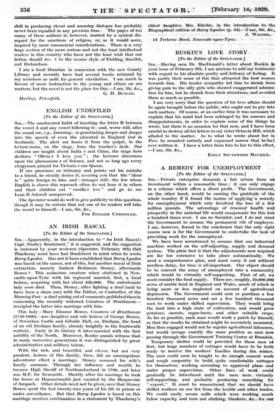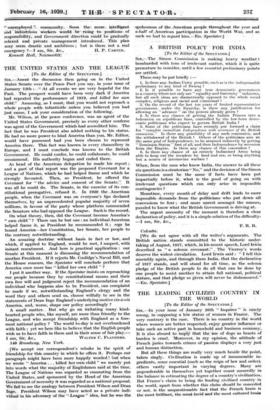• A. REMEDY . FOR UNEMPLOYMENT [To the Editor of
the SPECTATOR.] Snt,—Priitite enterprise • demands a fair return from an investment -within a reasonable time; it can 'only engage in' a tcheinu which offers a direct profit. • The -GoVernment, on 'the 6ther hand, Would. be earning the gratitude- Of the whole iountry if it" found the ntetins 'of afoplyinea remedy for unemproyment Which' only involved the loss' of a feW Inillfbn 'pounds. 'The advantage of ieene-i‘ed-- health and prosperity in the' natioha life would conipeinsate for this'll:it's a hundred times tiver."I ani no SOcialist,and- do not Want the-Government to assume the permanent role of employer.
I am, however, forced to the conclusion that the only right course now is for 'the Governinent to undertake the' task -of providing work for the unemployed: -
We have been accustomed to assume that our industrial
machine worked on the self-adjusting,, supply: and demand system.. The plain fact is that the adjustments now required are far' too extensive. to take place automatically: We need a comprehensive plan, and must carry it out without needless delay, for time is' all-important. Our object should be to convert the army of unemployed into a community which would be virtually 'self-supporting. First- of aH, we must consider the food supply: There are, roughly, 10;000,000 acres of arable land in England and Wales, much of which is being More or legs neglected on account of agricultural depression. • The Government could rent or purchase a few hundred thousand acres and set a few hundred thousand men to' work under skilled supervision. They would bring the land into a high state of cultivation, and would' groW potatoes; carrots, sugar-beets, and other suitable crops. As 'far as possible, each man would work a patch by himself; so that the results he obtained might be accurately meastrked; Men thus engaged would not be 'regular agricultural labourers, but would occupy exactly the same position as men now passing through the GOvernment Training' Centre at Brandon;
Temporary shelter could be provided for these men at
first, but large numbers of cottages would have Ad be built ready to receive the workers' families during the. winter: The men could soon be taught to do enough- cement work and rough carpentry to build, quite comfortable cottages for themselves, working according to approved plans and under proper supervision. Other . lines • of work could gradually :be introduced.: until . the men - were virtually self-supporting, and - probably - producing • something for " export.": It must be remembered that we should have skilled workers on our list: from the textile and other trades. We could easily secure mills ,which were working much below capacity and turnout clothing, blankets, die.,-for our " unemployed"- community. Soon. the: more-- intelligant and industrious viorkeis. - Wanid - tie•riging to. positions- - of responsibility; and Government direction could be gradually relaxed and private = managenient introchiced. This plan may seem. drastic and ambitious ; but is there not a real
Kennett Hall, lileicknorktt: . .











































 Previous page
Previous page